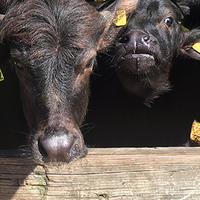The Organic Difference… Explained

Organic Foods can make a huge difference for dogs with allergies and intolerances, as how animals are reared and what they eat reflects the meat we feed in a huge way. So let’s have a look at what organic means and how it would impact on the health of your pet.
The importance of species-appropriate diets
The catchy sound bite “
you are what you eat” should be, you are what your animals eat” (by Jody Scheckter of Laverstoke Park Farm) … this applies as much to our own food as that of our pets, particularly in today’s market of highly processed offerings available in every supermarket.
One of the biggest reasons raw feeders choose a fresh diet is because it is species appropriate. Feeding a species appropriate diet means differences in health are often very quick to notice: immune systems are better, coats shinier, less susceptible to illness, and even when a pet does get ill recovery anecdotally is much quicker, as a body is in such good condition is able to heal itself faster and quicker. This is exactly the same for organically reared animals.
The animals at Laverstoke don’t get any grains (corn included) and they are fed on what on only be described as the poshest green salad ever! 31 kinds of grass and herbs are used to support their health but more importantly support the soil. As many studies have proven raising cattle on species appropriate foods mean they have a much better mineral make-up then grain fed cattle.
Visiting Laverstoke Park Farm; the sheep are white, they are the true fluffy clouds, the water buffalo have glossy dark black noses and hair which is shiny – good looking animals that speak health through a great diet as well as ethical husbandry. They look content and will do just about anything for a cuddle (and unfortunately a kiss)!

The importance of soil
The soil is where all life comes from … Conventional farming focuses on economics; on produce growing as fast as humanly possible in the smallest space available. To achieve this goal pesticides and herbicides are used. Whilst this approach might grow crops fast and animals quickly, soils become depleted as plants take up the minerals too fast. This is the vicious circle of modern agriculture – you need to grow fast and furious, and so chemicals are needed to replace the natural goodness of the soil. It was interesting to see the Mass Spectrometer at Laverstoke, a fantastic machine in their lab, which measures the minerals in the soil. They even use it to help golf courts to establish where they need to make changes, naturally with eg green manures, to have lush, lasting and quickly replenished grass.
In organic farming the emphasis lies on natural and slow growth to nourish the soil – it’s good bacteria, the small world of fungi so very beneficial to our health, to enrich it with plants, herbs and let’s not forget poo! This has an effect on the meat, this is also why you will not find superfoods needed with our Laverstoke range as the healthy soil is reflected in the end product. It is truly as complete as nature intended with all the amino acids, fatty acids, Omegas and vitamins and minerals YOUR pet needs.
The importance of water
Water is often overlooked or pushed aside as a minimal influencer of our food, however, it is interesting that there have been studies to say that compounds in the water we get through our taps eg, contribute to allergies in humans. This is because the herbicides used in farming, even the smallest compounds, end up in our water and the water animals drink. At Laverstoke they have their own water filtering system, and the water comes from very deep underneath the soil, thereby not relying on outside water sources and is free of dichlorophenols, fluoride and chlorine.
The importance of humanely keeping animals
Everything Laverstoke does promotes “natures ways to be humane to animals”. For those amongst us who have an interest in the dog, behaviour might have read the book by Temple Grandin. Temple Grandin is an American professor of animal science at Colorado State University with autism. She is a world-renowned autism spokesperson and consultant to the livestock industry on animal behaviour as well as dog behaviour. She was instrumental in creating a more humane approach to slaughter, which means that livestock goes through almost a cradle/hugging machine, are stomping around in straw and listening to music before slaughter creating a stressless environment. At Laverstoke all those ideals were implemented by Grandin herself. The dispatch of these beautiful animals, from a taste point of view, is essential. It ensures animals who get slaughtered are stress-free, as animals at slaughter who become stressed produce lactic acid. If this is lowered it will impact on not only taste but also shelf life of the meat.

Why feed organic, what is the difference?
If you add up all the above where organic can really make a huge difference is pets with allergies. Overall many pets that switch to a species appropriate diet will see a reduction in terms of allergic food responses.
Organic can help with
- protein specific allergies
- environmental allergies (“treating like with like” principle in small doses – think of the grasses, clovers and herbs)
- allergies to corn and cereals – organic is devoid of this
- pets who, due to illness, need an as clean as possible diet.
Some dogs are extremely sensitive to meat which has been produced using antibiotics, wormers, growth accelerators or drugs and organic can very much provide a solution to these types of sensitivities.




